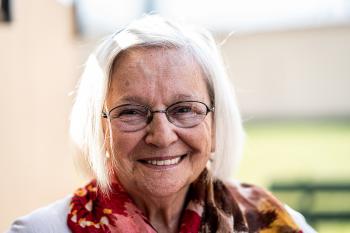Cervical Cancer Risks and Symptoms
December 8, 2023

Cancer of the cervix begins in the cells of the cervix. The cervix is the part of the uterus that connects the birth canal to the uterus. The cancer is often a slow-growing cancer, changing cells over time and making them cancerous. If those cells are not detected and removed, they spread deeper into the cervix and surrounding uterus.
Long-lasting HPV (human papillomavirus) infections are the cause of most cervical cancers. If your senior loved one was sexually active during any part of her life, she is at risk for developing cervical cancer because almost all people who are/were sexually active will become infected with HPV at some point. Most people’s bodies can fight off the virus within a year or two and the person never knows they had it and do not develop cancer from it. But for some, the HPV infection remains long-term, causing damage to those cells located in that area.
Some conditions can make your loved one more susceptible to developing a long-term HPV infection. If any of these are true for her, then following up on any symptoms that may appear quickly is important to ensure she hasn’t developed cervical cancer.
- Weakened Immune System. If your loved one has had a weakened immune system her entire life due to an autoimmune disease or the need to take medicine that suppresses her immune system, it can mean that her body was not able to fight off the HPV virus when it came into contact with it and she lived with it for years.
- Obesity. Those who are obese often have a harder time having their cervix screened regularly, making it easier for the disease to go undetected for a longer period. If your loved one is obese, work with her elder care team to help her find a healthy weight with proper diet and exercise to reduce this risk factor.
- Being a smoker or living with a smoker for a long period. Even if your loved one doesn’t smoke, but she’s lived with a family member or spouse who does smoke and she’s inhaled second-hand smoke, her risk will be increased. For her health, especially if she has other risk factors, never allow any guests or elder care providers to smoke in her presence.
- Reproductive history. If your aging loved one gave birth to a lot of children, her risk for cervical cancer is higher.
Knowing the risks is just a part of prevention. You also need to be able to help your loved one spot any early symptoms. Some might be tough for her to share with others, but encourage open and honest communication when it comes to health matters.
- Vaginal bleeding after menopause
- Strong-smelling vaginal discharge that may be watery or contain blood
- Bleeding from the rectum during bowel movements
- Painful urination
- Back pain
Remind your loved one to share any of these symptoms with you or her elder care provider so you can help her take the next steps of having a doctor examine her and find the cause of the symptoms, whatever that may be.
If you or your loved one is looking for Elder Care in Saratoga, CA, please call Familiar Surroundings Home Care.
Santa Clara County: (408) 979-9990
San Mateo County: (650) 353-9777
Santa Cruz County: (831) 480-3990


